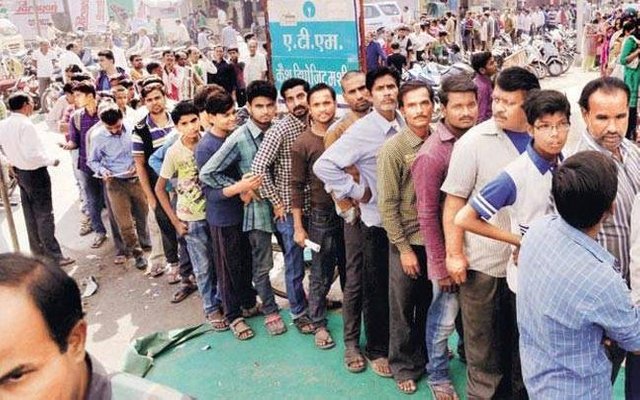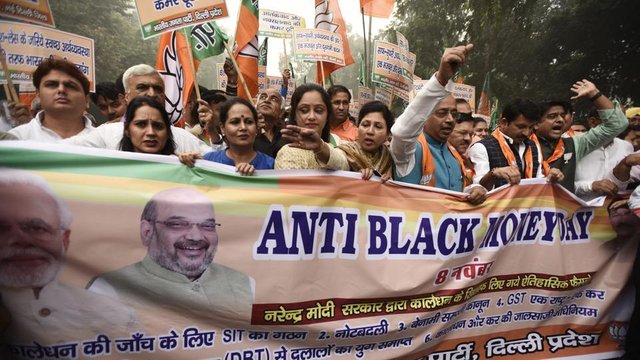

Support for demonetisation has considerably waned after a year, indicated an opinion poll conducted by C-Voter. Last year as many as 80 percent Indian respondents thought the inconvenience caused by demonetisation was worth the effort for fighting black money. A year later, this figure has gone down to 65 percent.
Last year, just about every fourth Indian was finding it difficult to manage day-to-day life because of demonetisation. That number has reduced slightly with around 15 percent of Indians saying the same. But if you add 25 percent of those who say that the problems have been 'huge', but they will somehow 'manage', you get a staggering number of 40 percent stating that they went through considerable hardship after the drive to ban old notes of Rs 500 and Rs 1,000 denominations was announced on 8 November, 2016.
At the time, it was just one in four respondents that began feeling the heat; all of a sudden, the narrative changed with every second Indian showing unhappiness over demonetisation. There was "discomfort" to this extent for sure, but somehow it did not translate to "unhappiness" on the same scale and to the same extent. If there could be one single explanation for this intriguing finding, it must be the unparalleled level of personal rapport and support that Prime Minister Narendra Modi carries with the Indian public at large.
Ample public support for the prime minister was displayed last year when 82 percent respondents opposed the "Bharat Bandh" call by the Opposition in the second week after demonetisation was announced. Back then, the prime minister’s strategy to call into question the Opposition’s morals had also borne fruit with 78 percent of respondents agreeing with his statement regarding the Opposition not getting enough time to manage their respective personal stashes. Last year, 52 percent said that Modi’s popularity had increased after his decision of demonetisation, but this figure has come down to only 43 percent. In other words, people "unhappy" with the prime minister on this issue jumped from around 17 percent last year to 32 percent at the time of writing.
Last year, in stark contrast to very high approval rates for other questions, around 66 percent of respondents deemed the execution of the scheme to be good. This year it came down to 51 percent of the respondents. Still, 15 percent stated that it was a "good idea that was poorly implemented". But the real worry for this government should come from the fact that the five percent of Indians who had said it was a "bad idea that was poorly implemented" last year has ballooned to 25 percent of respondents.
In other words, last year, just a handful had said that it was a "bad" idea, but within a year, every fourth Indian is openly saying that it was a bad idea, poorly implemented. I am sure these numbers are not going to please the decision-makers. However, the saving grace is the goodwill that Modi enjoys with the people. Last year, only 45 percent said they would support this exercise "no matter what". This year, that number has actually gone up to 62 percent, who said they would still support demonetisation "no matter what". The process itself might have brought hardship to scores of people, but they are still willing to take it on the chin and move forward, purely because they don’t doubt the intent of the exercise against black money.
But at the same time, the response to the question "Whom do you think demonetisation is hurting more?" delivers uncomfortable statistics. A majority of respondents believe the poor are hurt more than the rich due to this exercise. A year ago, this sentiment was split. Equally. Today, only 35 percent of respondents believe that the rich are hurt the most, while 49 percent believe that it is the poor who are hurt the most by demonetisation.
It is paradoxical that politically, it should have hurt the electoral prospects of the BJP when this perception grew, as the heavy hand of the State was supposed to fall disproportionately on the ill-gotten riches of the corrupt, and not the poor. But the electoral verdicts after demonetisation have gone in favour of the BJP. This only underlines that the trust the prime minister enjoys among the voters has carried over to the BJP. Nothing more, nothing less.
People have been waiting for a long time for some "Big Daddies" of corruption to get behind the bars. Last year, almost 84 percent said that there should be no roll-back. This underlined support for the cause. But in absence of some big ticket prosecution, this number has gone down to 67 percent at the time of writing.
So massive was the support for the cause and goodwill for the prime minister that last year almost 50 percent said the country's economy will weaken for some period, but it will be beneficial in the long run due to demonetisation. Add to this 20 percent who say the country's economy is benefiting at present and will continue to benefit, and you have a massive 70 percent of Indians optimistic about the future at large. This optimism has slightly depleted and reduced to 62 percent and the pessimist voices have gone up from around 11 percent to 20 percent, citing depression and doomsday scenarios. But the optimism stays intact with the fact that more than two-thirds of Indians believe that all this hardship and inconvenience was worth every penny in the fight against corruption.
Demonetisation was never a "just" economic or financial exercise. The poor of India strongly associate with causes of social justice and for them it has been a lifelong dream to see the untied/unaccountable brought to justice. There has been a political opportunity and challenge for Modi in turning the "caste-based" electoral equation to a broader "class-based" electoral equation. The have-nots did suffer due to the exercise, but it seems they were used to much worse suffering. It's likely that the honest have-nots are taking more pleasure in the perceived suffering of the corrupt "haves". That might explain the electoral outcomes defying the laws of gravity.
Hi! I am a robot. I just upvoted you! I found similar content that readers might be interested in:
http://www.firstpost.com/business/demonetisation-anniversary-public-support-for-note-ban-comes-crashing-down-in-absence-of-concrete-outcomes-4199297.html
Downvoting a post can decrease pending rewards and make it less visible. Common reasons:
Submit